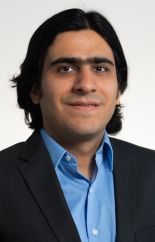Dr. Mohammad Heidarinejad is an Assistant Professor in the Department of Civil, Architectural, and Environmental Engineering (CAEE) at Illinois Institute of Technology. His research interests center on building energy and environmental systems and indoor air quality. Mohammad is a registered professional engineer and has published 39 peer-reviewed journal articles. He teaches several courses such as Instrumentation and Measurements in Building Science, Energy Conversion Design in Buildings, Design of HVAC Systems, and Control of Building Environmental Systems. He also co-leads the Built Environment Research Group (BERG) with Dr. Brent Stephens, which includes undergraduate students, graduate students, and postdoctoral fellows.
Mohammad has been the recipient of several prestigious awards, including American Society of Heating, Refrigerating, and Air-Conditioning Engineers (ASHRAE) New Investigator Award (NIA) in 2019 to support his research and educational work on improving control sequences in existing buildings. He is currently an Associate Editor for the Journal of Architectural Engineering and an Editorial Board member of Journal of Advances in Building Energy Research. Mohammad is active in the technical committees including: (i) Secretary of the International Society for Indoor Air Quality and Climate (ISIAQ) Technical Committee (STC) 21 on Ventilation and (ii) Voting Member and Handbook Chair for ASHRAE’s TC 1.4 on Indoor Environmental Modeling. Prior to joining IIT, He was a research associate and research assistant professor at the University of Maryland College Park.
Community Projects
Dr. Stephens and Dr. Heidarinejad seek to work with communities to help solve their energy and environmental problems. They have a long-standing relationship with Elevate, a nonprofit organization in Chicago focused on ensuring access to clean and affordable heat, power, and water in homes and communities. They have worked together on research funded by the U.S. Department of Housing and Urban Development, including a recently completed project in which they recruited households with adult asthmatics, provided mechanical ventilation systems to improve indoor air, and evaluated the impacts of the systems on IAQ and asthma outcomes.
Drs. Stephens and Heidarinejad have also recently partnered with the Public Health Institute on a project funded by the U.S. Environmental Protection Agency to reduce wildfire smoke exposures and health risks among agricultural workers and other low-income families in California’s central valley by designing and field testing an affordable and effective filtration system for rooftop evaporative coolers, which are often used to cool homes without air conditioning.
Another area in which Drs. Stephens and Heidarinejad have worked with the local community is the development and application of low-cost and flexible engineering solutions to retrofit existing buildings for improved energy efficiency and comfort. Most recently, this work has been supported by Franklin Energy and has focused on retrofits to buildings on IIT’s main campus, including development and deployment of a low-cost indoor environmental monitoring platform, a custom automatic radiator control system, and a new radiator steam trap monitoring solution to detect and diagnose failures. The team is actively pursuing implementation to assist other communities in Chicago with older, existing buildings in need of improvements.


